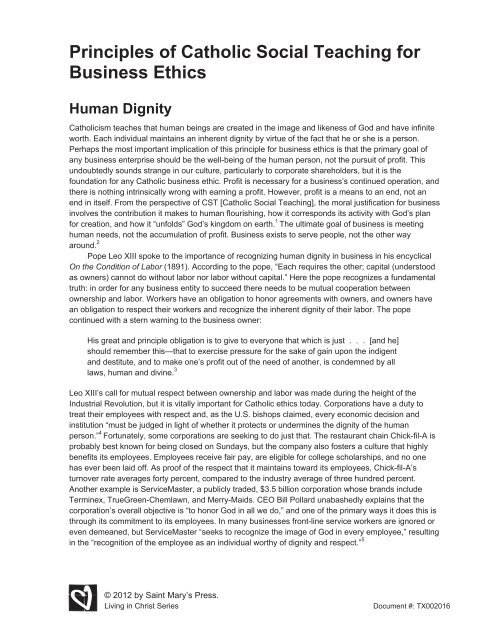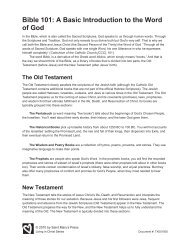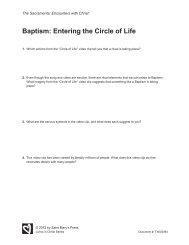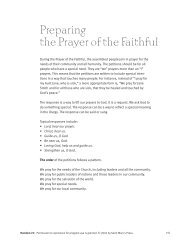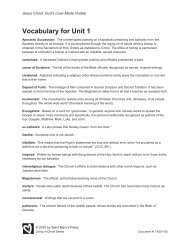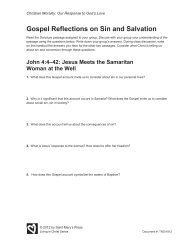Principles of Catholic Social Teaching for Business Ethics Human ...
Principles of Catholic Social Teaching for Business Ethics Human ...
Principles of Catholic Social Teaching for Business Ethics Human ...
You also want an ePaper? Increase the reach of your titles
YUMPU automatically turns print PDFs into web optimized ePapers that Google loves.
<strong>Principles</strong> <strong>of</strong> <strong>Catholic</strong> <strong>Social</strong> <strong>Teaching</strong> <strong>for</strong><strong>Business</strong> <strong>Ethics</strong><strong>Human</strong> Dignity<strong>Catholic</strong>ism teaches that human beings are created in the image and likeness <strong>of</strong> God and have infiniteworth. Each individual maintains an inherent dignity by virtue <strong>of</strong> the fact that he or she is a person.Perhaps the most important implication <strong>of</strong> this principle <strong>for</strong> business ethics is that the primary goal <strong>of</strong>any business enterprise should be the well-being <strong>of</strong> the human person, not the pursuit <strong>of</strong> pr<strong>of</strong>it. Thisundoubtedly sounds strange in our culture, particularly to corporate shareholders, but it is thefoundation <strong>for</strong> any <strong>Catholic</strong> business ethic. Pr<strong>of</strong>it is necessary <strong>for</strong> a business’s continued operation, andthere is nothing intrinsically wrong with earning a pr<strong>of</strong>it. However, pr<strong>of</strong>it is a means to an end, not anend in itself. From the perspective <strong>of</strong> CST [<strong>Catholic</strong> <strong>Social</strong> <strong>Teaching</strong>], the moral justification <strong>for</strong> businessinvolves the contribution it makes to human flourishing, how it corresponds its activity with God’s plan<strong>for</strong> creation, and how it “unfolds” God’s kingdom on earth. 1 The ultimate goal <strong>of</strong> business is meetinghuman needs, not the accumulation <strong>of</strong> pr<strong>of</strong>it. <strong>Business</strong> exists to serve people, not the other wayaround. 2Pope Leo XIII spoke to the importance <strong>of</strong> recognizing human dignity in business in his encyclicalOn the Condition <strong>of</strong> Labor (1891). According to the pope, “Each requires the other; capital (understoodas owners) cannot do without labor nor labor without capital.” Here the pope recognizes a fundamentaltruth: in order <strong>for</strong> any business entity to succeed there needs to be mutual cooperation betweenownership and labor. Workers have an obligation to honor agreements with owners, and owners havean obligation to respect their workers and recognize the inherent dignity <strong>of</strong> their labor. The popecontinued with a stern warning to the business owner:His great and principle obligation is to give to everyone that which is just . . . [and he]should remember this—that to exercise pressure <strong>for</strong> the sake <strong>of</strong> gain upon the indigentand destitute, and to make one’s pr<strong>of</strong>it out <strong>of</strong> the need <strong>of</strong> another, is condemned by alllaws, human and divine. 3Leo XIII’s call <strong>for</strong> mutual respect between ownership and labor was made during the height <strong>of</strong> theIndustrial Revolution, but it is vitally important <strong>for</strong> <strong>Catholic</strong> ethics today. Corporations have a duty totreat their employees with respect and, as the U.S. bishops claimed, every economic decision andinstitution “must be judged in light <strong>of</strong> whether it protects or undermines the dignity <strong>of</strong> the humanperson.” 4 Fortunately, some corporations are seeking to do just that. The restaurant chain Chick-fil-A isprobably best known <strong>for</strong> being closed on Sundays, but the company also fosters a culture that highlybenefits its employees. Employees receive fair pay, are eligible <strong>for</strong> college scholarships, and no onehas ever been laid <strong>of</strong>f. As pro<strong>of</strong> <strong>of</strong> the respect that it maintains toward its employees, Chick-fil-A’sturnover rate averages <strong>for</strong>ty percent, compared to the industry average <strong>of</strong> three hundred percent.Another example is ServiceMaster, a publicly traded, $3.5 billion corporation whose brands includeTerminex, TrueGreen-Chemlawn, and Merry-Maids. CEO Bill Pollard unabashedly explains that thecorporation’s overall objective is “to honor God in all we do,” and one <strong>of</strong> the primary ways it does this isthrough its commitment to its employees. In many businesses front-line service workers are ignored oreven demeaned, but ServiceMaster “seeks to recognize the image <strong>of</strong> God in every employee,” resultingin the “recognition <strong>of</strong> the employee as an individual worthy <strong>of</strong> dignity and respect.” 5© 2012 by Saint Mary’s Press.Living in Christ SeriesDocument #: TX002016
<strong>Principles</strong> <strong>of</strong> <strong>Catholic</strong> <strong>Social</strong> <strong>Teaching</strong> <strong>for</strong> <strong>Business</strong> <strong>Ethics</strong> Page | 2<strong>Catholic</strong> ethics’ call <strong>for</strong> corporations to uphold human dignity does not end with employees; itextends to relationships with customers, shareholders, suppliers, subcontractors, and any otherstakeholder. Each must be treated with dignity and respect.One visible way that American corporations can promote human dignity is by fostering justworking conditions. CST maintains that human work has an inherent dignity <strong>for</strong> three primaryreasons. First, work is the principal means by which we satisfy our material needs. The food weeat, the clothes we wear, and the homes we live in are provided by the wages we earn from ourwork. Second, work is a means to participate with God in the continual re-creation <strong>of</strong> the world.<strong>Catholic</strong>ism teaches that God endows each person with particular talents, which he or she mustuse to improve the condition <strong>of</strong> human life. Third, CST maintains the dignity <strong>of</strong> work becauseindividuals “become who they are,” in part, through their work activity. As a society, we tend toemphasize the objective nature <strong>of</strong> work: how much we produce, how much we sell, how manyhours we bill. However, our work also affects who we are as persons. This is the subjectiveaspect <strong>of</strong> work, the aspect that Pope John Paul II highlighted in his encyclical On <strong>Human</strong> Work(1981):[The human] is a person, that is to say, a subjective being capable <strong>of</strong> acting in a plannedand rational way, capable <strong>of</strong> deciding about himself, and with a tendency to selfrealization.As a person, man is there<strong>for</strong>e the subject <strong>of</strong> work. As a person he works . . .[and] these actions must all serve to realize his humanity. 6The pope continued by claiming that as work intimately involves the individual’s self-worth, selfexpression,and self-fulfillment, the value <strong>of</strong> human work ultimately rests with the person who per<strong>for</strong>msit. <strong>Human</strong> work maintains an inherent dignity and must never be viewed as a commodity that can bebought and sold.This understanding <strong>of</strong> work’s inherent dignity has a number <strong>of</strong> important implications <strong>for</strong> Americancorporations. First, it means that corporations have a moral obligation to pay employees a just or livingwage, one that is sufficient to meet the basic needs <strong>of</strong> the employee’s family and to allow <strong>for</strong> futureinvestment. Our nation’s current federal minimum wage is hardly sufficient to allow an individual, muchless a family, to live a dignified life. Determining a just wage involves many factors including the nature<strong>of</strong> the job, the firm’s capabilities, the local cost <strong>of</strong> living, the fairness <strong>of</strong> wage negotiations, and the goingrate <strong>of</strong> pay within the industry itself. 7Corporations must be aware <strong>of</strong> what a living wage is in their local area and pay salariescommensurate with it. Corporations also need to reevaluate their levels <strong>of</strong> executive compensation. Noone begrudges an executive <strong>for</strong> earning a salary greater than that <strong>of</strong> a line production worker, but thediscrepancies we see today raise serious questions <strong>of</strong> justice. The AFL-CIO reports that in 1980corporate CEOs earned 42 times the salary <strong>of</strong> an average worker. By 1990 this ratio increased to 107times, and by 2008 it had jumped to 319 times. 8 In terms <strong>of</strong> real numbers, the average 2008compensation <strong>for</strong> a Standard and Poor’s 500 CEO was $10.9 million, while the median U.S. householdincome was $52,029. 9 The issue <strong>of</strong> executive pay has taken on greater public scrutiny in recent yearsas taxpayers demand to know why banks and investment firms that received billions <strong>of</strong> dollars in TARP(Troubled Asset Relief Program) funds had paid—and continue to pay—tens <strong>of</strong> millions <strong>of</strong> dollars insalary and bonuses to the executives who led their firms into crisis. For example, JP Morgan ChaseCEO Jamie Dimon earned $28.8 million in 2007, yet less than a year later his company accepted $25billion in taxpayer bailouts. Goldman Sachs received $10 billion in TARP funds during 2008, yet a yearearlier its CEO, Lloyd Blankfein, was compensated a whopping $53.9 million. In an ef<strong>for</strong>t to appease© 2012 by Saint Mary’s Press.Living in Christ SeriesDocument #: TX002016
<strong>Principles</strong> <strong>of</strong> <strong>Catholic</strong> <strong>Social</strong> <strong>Teaching</strong> <strong>for</strong> <strong>Business</strong> <strong>Ethics</strong> Page | 4Although the <strong>Catholic</strong> Church historically has supported the rights <strong>of</strong> workers, as well as the labormovement as a whole, this support is not without limits. CST maintains that union members haveimportant moral duties as well. Workers must use their collective power <strong>for</strong> the common good <strong>of</strong> societyas a whole (including workers in developing nations), and not simply <strong>for</strong> their own individual good or thegood <strong>of</strong> the union itself. When union members exercise their right to strike, they must do so only <strong>for</strong>“extreme” reasons, must never resort to violence, and must never abuse or subsume this right undersome “external” political motivation. Finally, union managers have a responsibility to exercise properstewardship <strong>of</strong> union recourses and to uphold the good name <strong>of</strong> the entire union movement. 14Endnotes1. James Wishl<strong>of</strong>f, “<strong>Catholic</strong> <strong>Social</strong> Thought and <strong>Business</strong> <strong>Ethics</strong>: The Application <strong>of</strong> 10 <strong>Principles</strong>,” Review <strong>of</strong> <strong>Business</strong> 25,number 1 (Winter 2004): 22; and Shirley Roels, “<strong>Business</strong> Goals and Processes” in On Moral <strong>Business</strong>: Classical andContemporary Resources <strong>for</strong> <strong>Ethics</strong> in Economic Life, ed. Max Stackhouse et al. (Grand Rapids, MI: Eerdmans, 1995), 912.See also Benedict XVI, Charity in Truth, number 21.2. USCCB, Economic Justice <strong>for</strong> All, number 13.3. Leo XIII, On the Condition <strong>of</strong> Labor, in O’Brien and Shannon, eds., <strong>Catholic</strong> <strong>Social</strong> Thought, numbers 15–17.4. USCCB, Economic Justice <strong>for</strong> All, number 13.5. Lake Lambert III, Spirituality, Inc: Religion in the American Workplace (New York: New York University Press, 2009), 58–59,64.6. John Paul II, On <strong>Human</strong> Work, in O’Brien and Shannon, eds., <strong>Catholic</strong> <strong>Social</strong> Thought, number 6. See also Economic Justice<strong>for</strong> All, numbers 72 and 97.7. Manuel Velasquez , <strong>Business</strong> <strong>Ethics</strong>: Concepts and Cases, 5th ed. (Upper Saddle River, NJ: Prentice Hall, 2002), 457–58.See also Economic Justice <strong>for</strong> All, number 73 and numbers 194–95.8. See the AFL-CIO Web site at www.aflcio.org/corporatewatch/paywatch/. We should note that this ratio is actually less than itwas in 2000, due in large measure to the recession that began in 2007.9. Median household income in<strong>for</strong>mation is taken from the U.S. Census Bureau at quickfacts.census.gov/qfd/states/0000.html.10. Pope Benedict XVI warned that although there may be rational reasons <strong>for</strong> it, outsourcing has prompted a new <strong>for</strong>m <strong>of</strong>competition among developing nations, one that threatens worker rights and undermines the viability <strong>of</strong> traditional socialsecurity systems. See Benedict XVI, Charity in Truth, number 25.11. Leo XIII, On the Condition <strong>of</strong> Labor, in O’Brien and Shannon, eds., <strong>Catholic</strong> <strong>Social</strong> Thought, numbers 48, 51.12. John Paul II, On <strong>Human</strong> Work, in O’Brien and Shannon, eds., <strong>Catholic</strong> <strong>Social</strong> Thought, number 20.13. USCCB, Economic Justice <strong>for</strong> All, number 104.14. USCCB, Economic Justice <strong>for</strong> All, number 106. See also Benedict XVI, Charity in Truth, number 64.(This article is from <strong>Catholic</strong> <strong>Ethics</strong> in Today’s World, revised edition, by Jozef D. Zalotand Benedict Guevin, OSB [Winona, MN: Anselm Academic, 2011]. Copyright © 2008,2011 by Jozef D. Zalot and Benedict Guevin. Used with permission <strong>of</strong> AnselmAcademic.)© 2012 by Saint Mary’s Press.Living in Christ SeriesDocument #: TX002016


